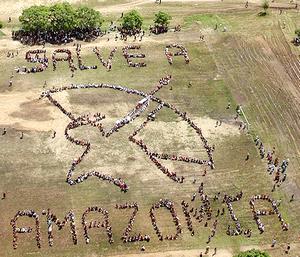Human Banner Formed to Defend Amazon Rainforest
BELEM, Brazil, January 29, 2009 (ENS) - Indigenous people from across Latin America led more than 1,000 World Social Forum participants to form a human banner Tuesday, using their bodies to dramatize the increasingly precarious situation of the Amazon rainforest, recognized as a key to climate stability.
Around the silhouette of a warrior taking aim with a bow and arrow, indigenous leaders, environmentalists and activists spelled out the message "SALVE A AMAZONIA," which means Save the Amazon in Portuguese.
 |
Human banner at the World Social Forum January 27, 2009 (Photo courtesy Amazon Watch) |
"We are the guardians of the forest," said Marco Apurina, vice-coordinator of COIAB, Brazil's leading Amazonian indigenous organization. "This is a critical moment for indigenous peoples to unite with non-indigenous, activists, teachers, environmentalists, unions, government. The Amazon rainforest needs everyone to work together now to defend it before it's too late."
The Amazon Basin encompasses 5.5 million square kilometers of rainforest and includes territory belonging to nine nations.
The Amazon contains over half of the planet's remaining rainforest, but nearly 20 percent of the Amazon wilderness area has been deforested over the past 40 years.
The mean annual deforestation rate from 2000 to 2005 amounted to 22,392 square kilometers per year, a rate that was 18 percent higher than in the previous five years.
The indigenous peoples of the Amazon see its conservation as their sacred responsibility. COIAB said in a statement, "With the permission of our ancestors' spirits, we indigenous peoples are here with our friends from all corners of the Earth. We build this symbol with our bodies as the cry of living beings from this green forest, this planet, for our continuity as humans and diverse creatures."
"The symbol of the bow and arrow has three meanings," COIAB explained. "The first, our aim that every man, woman, and child will decide to care for our planet; the second, the position of defending the rights of indigenous peoples, of nature, of the planet, and of our home the Amazon; the third, to send a message to the world so that each of us helps to protect our home, our air, our water, our food."
"It is urgent that the world act now to stop deforestation and to recognize the importance of the Amazon in stabilizing our climate," said Atossa Soltani, executive director of Amazon Watch, an advocacy organization based in Washington, DC. "There needs to be an immediate halt to industrial resource extraction that is bringing the ecosystems and cultures of the Amazon to the brink of collapse."
 |
Indigenous participants in the human banner at the World Social Forum (Photo courtesy Amazon Watch) |
If development plans for the Amazon continue unchecked, warned Soltani, scientists predict that the entire Amazon region will be at the brink of permanent ecological collapse within the next 10 to 20 years. This process would release massive amounts of carbon into the atmosphere, accelerating global climate change.
"This amazing action brought together indigenous people from all over the Amazon, raising spears and traditional weapons to the sky," said Andrea Samulon, campaigner at the Rainforest Action Network, based in San Francisco.
"This banner truly is a call to the world from indigenous peoples all over the continent," said Samulon "The world needs to pay attention now."
The state of the Amazon is a critical focus during this World Social Forum, with one full day devoted to discussing the problems facing the world's largest rainforest and the indigenous peoples who depend on it.
On Friday, the forum will host a panel on water, land and "the plundering of natural resources, the economic basis for national oppression."
For the first time at the World Social Forum, representatives of 30 different stateless nations and indigenous peoples from across the world will share a tent and a three-day program of lectures, roundtables and workshops.
Palestinian representatives join those from Kurdistan, Balochistan, Catalonia, Basque Country, Tamil, Saharan, Western Shoshone and Andean indigenous peoples, among others, to participate in the Space for Collective Rights of Peoples and other World Social Forum discussions.
Activities in the Collective Rights tent will explore the right of self-determination and sovereignty of peoples of stateless nations, indigenous communities, and marginalized groups.
One of the main issues in the Collective Rights tent is the conflict over the occupied Palestinian territory. At a General Assembly for Palestine slated for Saturday, Palestinian organizations and those groups that support Palestine will take part in a forum of discussion and debate.
Copyright Environment News Service (ENS) 2008. All rights reserved.
To subscribe or visit go to: http://www.ens-newswire.com